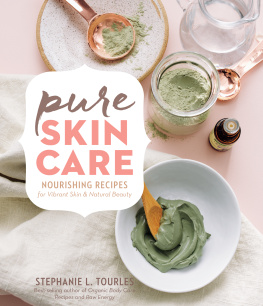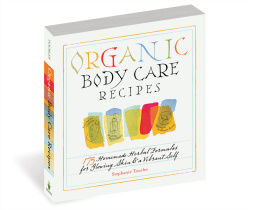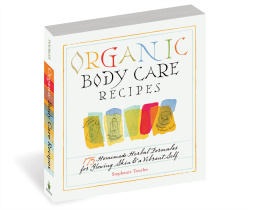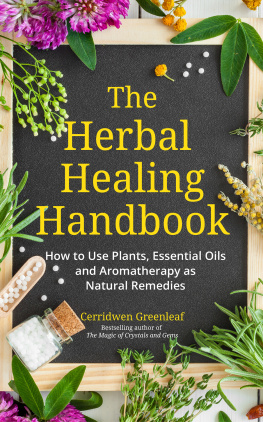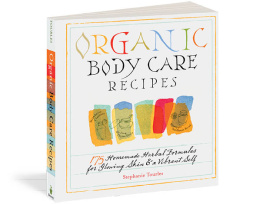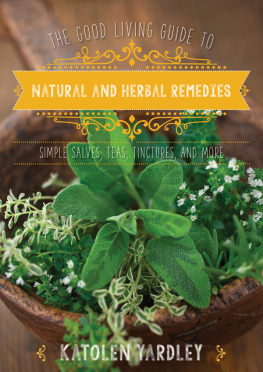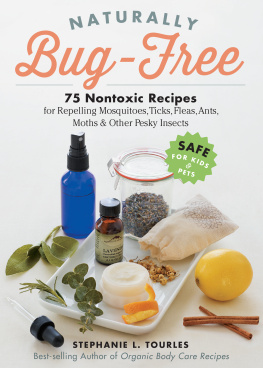Hands on Healing Remedies
150 Recipes for Herbal Balms, Salves, Oils, Liniments & Other Topical Therapies
Stephanie L. Tourles
Illustrations by Samantha Hahn

The mission of Storey Publishing is to serve our customers by
publishing practical information that encourages
personal independence in harmony with the environment.
Edited by Deborah Balmuth and Lisa H. Hiley
Art direction and book design by Mary Winkelman Velgos
Text production by Liseann Karandisecky
Illustrations by Samantha Hahn, except for by Alison Kolesar
Authors photograph by Debra Bell
Indexed by Andrea Chesman
2012 by Stephanie L. Tourles
All rights reserved. No part of this book may be reproduced without written permission from the publisher, except by a reviewer who may quote brief passages or reproduce illustrations in a review with appropriate credits; nor may any part of this book be reproduced, stored in a retrieval system, or transmitted in any form or by any means electronic, mechanical, photocopying, recording, or other without written permission from the publisher.
The information in this book is true and complete to the best of our knowledge. All recommendations are made without guarantee on the part of the author or Storey Publishing. The author and publisher disclaim any liability in connection with the use of this information.
Storey books are available for special premium and promotional uses and for customized editions. For further information, please call 1-800-793-9396.
Storey Publishing
210 MASS MoCA Way
North Adams, MA 01247
www.storey.com
Printed in the United States by R.R. Donnelley
10 9 8 7 6 5 4 3 2 1
Library of Congress Cataloging-in-Publication Data
Tourles, Stephanie L., 1962
Hands-on healing remedies / by Stephanie L. Tourles.
p. cm.
Includes bibliographical references and index.
ISBN 978-1-61212-006-5 (pbk. : alk. paper)
ISBN 978-1-60342-877-4 (e-book)
1. Materia medica, Vegetable. 2. Naturopathy. I. Title.
RS164.T684 2012
615.535dc23
2012027705
To my dearest Bill my husband, partner, and best friend. Your never-ending energy, independent spirit, support, and encouragement uplift me in all that I do. I treasure the boulder-lined garden you created for me, filled with incredibly deep, dark, fertile, crumbly soil. Its a garden beyond my wildest dreams. My culinary and healing herbs thrive, the vegetable plants strain under their heavy yields, and the flowers explode with vibrant colors eliciting curiosity from the neighbors, causing them to wonder if I have magical, quick-fingered plant fairies who work in and maintain my massive jungle of a garden under the cloak of darkness. It makes me chuckle. I cherish every moment we have together on this incredible journey we call life, my dear Willy.
And in memory of Mainie, my 20-pound, middle-aged, semi-wild Maine Coon cat who loved to sleep in my chamomile patch on warm late-spring afternoons. When sick or injured, hed let me feed him dropper after dropper of chamomile tea, which zonked him right out and usually had him feeling better within a matter of days. Mainie definitely chose German chamomile as his herbal ally; unfortunately, it couldnt protect him from cars.
acknowledgments
In writing this book, Im indebted to the great herbal teachers and elders who have shaped my green education over the years: Mrs. Ottie Faye Ashe and Mrs. Eveline Pilkington, for sharing their handwritten herbal formulas with me, many of which date back to the mid-nineteenth century; my grandfather Earl C. Ashe, who initiated me into this healing world of herbalism; and my grandmother Phenie S. Ashe, the possessor of the greenest thumb on earth. Much gratitude goes out to Candis Cantin, Anne McIntyre, Rosemary Gladstar, Deb Soule, and Michael Tierra, teachers with whom Ive had a chance to study varying traditions of herbal wisdom, namely Ayurvedic, Western, and Chinese.
Ive been researching and formulating topical, plant-based healing recipes for the past three decades, and I am indeed grateful to all of you who have volunteered to be my guinea pigs, my live subjects on whom I was allowed to test my herbal formulations and receive much valued feedback. And lastly, thanks to Deborah Balmuth, my longtime, beloved editor, for giving me the opportunity to share these healing remedies with you, my dear readers.
Contents
Introduction

It was the early 1900s, and like other self-reliant folk in the Great Smoky Mountains region of North Carolina, my great-grandmother, Maude Ashe, practiced the basic yet effective traditional healing arts of her ancestors, supplemented by a few remedies acquired from the local Cherokee Indians, in order to care for her familys ills. She, like so many other housewives of the day, was expected to be the family doctor, if need be. Making effective, gentle medicine generally wasnt a complicated affair. If an infant had colic, you fed him a little warm catnip, chamomile, or calendula tea and bathed him in a linden flower or catnip tea bath. If you had a bad cough, you could make a fine soothing medicine from honey, strong black cherry bark tea, and real apple cider vinegar. My great-grandmother, along with her many children, explored the hollows and hills of impoverished Appalachia, learning to identify the local flora and fauna, and collected beneficial herbs to use as healing medicines. Whether intentioned or not, she passed this knowledge down to my grandfather, Earl C. Ashe.
I never planned on becoming an herbalist, a lover of the plant kingdom, a creator of healing formulas. I think it was and is my destiny. I inherited my I can grow anything green thumb and green blood from my grandmother, Phenie Sims Ashe, and my initiation into herbalism came under the tutelage of my grandfather.
Several times a year, my family would make the two-hour drive north from our suburban home in Stone Mountain, Georgia, to my grandparents 20-acre country homestead located in Clarkesville. My brother, Shawn, and I loved to visit the country so many things to see and do. Shawn liked to go visit the cows out in the back pasture and tour the barn, and I was drawn to the gardens, fields, woods, and streams. We liked to walk and explore with my grandfather as he did his chores. On one particular walk, my grandfather and I were hiking through cattle pastures and woods his big, rough farmer hand holding my soft little girl hand and I can remember him telling me, Where we grew up, we didnt go to doctors unless it was a dire emergency. We didnt have the money. Our mother made medicine from the local herbs and she dosed us with that, whether we liked it or not. The stuff you had to swallow often didnt taste good. The medicines that got rubbed into your skin, like the herbal salves, thickened with local beeswax, lard, or lanolin, and the brownish-green colored liniments made with homemade grape wine or corn whiskey, were used to prevent infections, relieve stuffiness, help you sleep, or make your muscles feel better after a long day at work. Those things worked real nice and most times smelled pretty good, too. I was intrigued.
Thus began my training. From then on, sensing my interest, my grandfather turned our walks into botany and chemistry classes so to speak. He taught me the names of the trees and the green plants, the uses and medicinal properties of tree bark, acorns, pine sap, roots, leaves, flowers, and even the gray-blue clay in the stream banks. I can remember my fourth-grade science teacher being amazed at how much I knew! I learned that these free-for-the-taking medicines of the earth could aid the bodys natural processes to heal illnesses within and without. I fell in love with the idea that nature could provide just about anything you needed to naturally care for your health and beauty. I was hooked. I was in awe of my grandfathers knowledge and absorbed it like a sponge. Unbeknownst to me, I was a budding herbalist.


